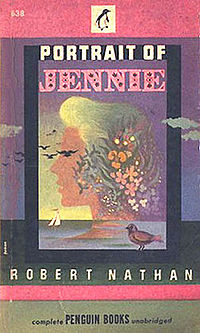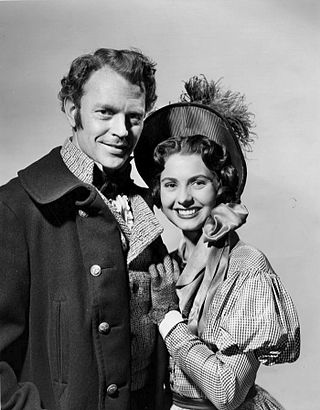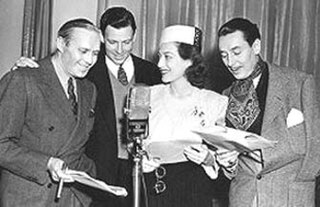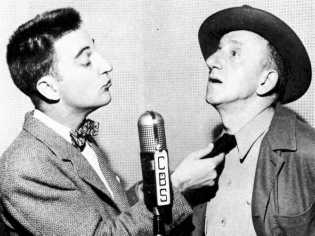Related Research Articles
The year 1953 in television involved some significant events. Below is a list of television-related events during 1953.
The Alan Young Show is an American radio and television series presented in diverse formats over a nine-year period and starring English-born comedian Alan Young.
The Six Shooter is a United States Western old-time radio program starring James Stewart as a gunfighter. It was created by Frank Burt, who also wrote many of the episodes, and lasted only one season of 39 episodes on NBC. Initially, it was broadcast on Sundays at 9:30 pm Eastern Time, through October 11. Then it was heard at 8:30 pm for three weeks. Finally, on November 8, 1953, through March 21, 1954, it was broadcast Sundays at 8 pm; beginning April 1, 1954, through the final episode, it was on Thursdays at 8:30 pm. One old-time radio directory called the program "a last, desperate effort by a radio network (NBC) to maintain interest in adventure drama by employing a major Hollywood movie star in the leading role."

Boris Karloff (1887–1969) was an English actor. He became known for his role as Frankenstein's monster in the 1931 Frankenstein, leading to a long career in film, radio, and television.

An anthology series is a written series, radio, television, film, or video game series that presents a different story and a different set of characters in each different episode, season, segment, or short. These usually have a different cast in each episode, but several series in the past, such as Four Star Playhouse, employed a permanent troupe of character actors who would appear in a different drama each week. Some anthology series, such as Studio One, began on radio and then expanded to television.

Academy Award is a CBS radio anthology series, which presented 30-minute adaptations of plays, novels, or films.

Schlitz Playhouse of Stars is an anthology series that was telecast from 1951 until 1959 on CBS. Offering both comedies and drama, the series was sponsored by the Joseph Schlitz Brewing Company. The title was shortened to Schlitz Playhouse beginning with the fall 1957 season.

Ford Theatre, spelled Ford Theater for the original radio version and known, in full, as The Ford Television Theatre for the TV version, is a radio and television anthology series broadcast in the United States in the 1940s and 1950s. At various times the television series appeared on all three major television networks, while the radio version was broadcast on two separate networks and on two separate coasts. Ford Theatre was named for its sponsor, the Ford Motor Company, which had an earlier success with its concert music series, The Ford Sunday Evening Hour (1934–42).
The year 1949 saw a number of significant events in radio broadcasting history.

The Screen Guild Theater is a radio anthology series broadcast from 1939 until 1952 during the Golden Age of Radio. Leading Hollywood stars performed adaptations of popular motion pictures. Originating on CBS Radio, it aired under several different titles including The Gulf Screen Guild Show, The Gulf Screen Guild Theater, The Lady Esther Screen Guild Theater and The Camel Screen Guild Players. Fees that would ordinarily have been paid to the stars and studios were instead donated to the Motion Picture Relief Fund, and were used for the construction and maintenance of the Motion Picture Country House.
Radio City Playhouse is a live half-hour anthology series that aired on NBC Radio from July 3, 1948 to January 1, 1950. Directed by Harry W. Junkin, with music by Dr. Roy Shield, and announcers Bob Warren (1948–49) and Fred Collins (1949–50), the series presented original radio dramas regardless of the fame of the author, so long as they were considered 'good'. Many of the broadcasts have survived and can be heard on websites specializing in old-time radio.

Club Fifteen is a radio program in the United States that featured popular music. It was broadcast weeknights 30 June 1947 – 21 December 1951. Then, it aired Monday, Wednesday, and Friday nights until 16 January 1953. The name reflected the program's length—15 minutes. The Historical Dictionary of Old-Time Radio noted that the show "is sometimes listed as Bob Crosby's Club Fifteen because Bob Crosby was the original star, although Dick Haymes took over in 1949-50." The program was sponsored by Campbell Soups.
Philip Morris Playhouse is a 30-minute old-time radio dramatic anthology series.
The Saint was a radio adventure program in the United States that featured a character created by author Leslie Charteris. As the program's introduction said, The Saint, was "known to millions from books, magazines, and motion pictures." Several versions of the program appeared on different networks.

The Martin and Lewis Show is a radio comedy-variety program in the United States starring the comedy duo Martin and Lewis, consisting of Dean Martin and Jerry Lewis. It was broadcast on the NBC Radio Network beginning April 3, 1949, and ending July 14, 1953.

The Durante-Moore Show was an old-time radio show that ran on NBC with episodes running from March 25, 1943–October 28, 1943 and on CBS with episodes running from October 8, 1943–June 27, 1947.

For the television series of the same name, see The Silver Theatre.
Hallmark Playhouse is an American old-time radio dramatic anthology series. It was broadcast on CBS from June 10, 1948 until February 1, 1953, and was described by one author as "a program that consistently produced the highest levels of production quality and value." Beginning on February 8, 1953, the program underwent changes of title, host, and format. It was broadcast as The Hallmark Hall of Fame until March 27, 1955, still on CBS.
.
Screen Directors Playhouse is an American radio dramatic anthology program that was broadcast on NBC from January 9, 1949, through September 28, 1951. Initially it was called NBC Theater.
References
- ↑ "NBC's 'Playhouse' For July 6 Debut". The Billboard. June 11, 1949. p. 7. Retrieved 2024-11-14.
- ↑ "W. C. Hiatus Starters Feeling NBC Axe". The Billboard. August 27, 1949. p. 7. Retrieved 2024-11-14.
- 1 2 "Plethora of Summer Shows Swells Coast NBC Operations". The Billboard. July 2, 1949. p. 6. Retrieved 2024-11-14.
- ↑ "NBC's Answer to CBS 'Family Hour of Stars'". Variety. June 15, 1949. p. 22. Retrieved June 15, 2024.
- 1 2 Dunning, John. (1976). Tune in Yesterday: The Ultimate Encyclopedia of Old-Time Radio, 1925-1976. Prentice-Hall, Inc. ISBN 0-13-932616-2. P. 215.
- ↑ Reinehr, Robert C. & Swartz, Jon D. (2008). Historical Dictionary of Old-Time Radio. Scarecrow Press, Inc. ISBN 978-0-8108-7616-3. P. 102.
- 1 2 "Four Star Playhouse". The Digital Deli Too. Retrieved 10 March 2014.
- 1 2 Morse, Leon (July 23, 1949). "Four Star Playhouse (review)". The Billboard. p. 15. Retrieved 2024-11-14.